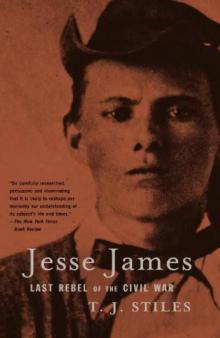T. J. Stiles 

by Jesse James: Last Rebel of the Civil War
Genre: Other5
Published: 1994
View: 2963
Read OnlineRead T. J. Stiles Storyline:
Amazon.com ReviewProbably no American outlaw has attracted more attention--much of it flattering--than Jesse James. This revisionist biography by T.J. Stiles delves into the exciting life James led--"a tale of ambushes, gun battles, and daring raids, of narrow escapes, betrayals, and revenge." Yet it also places James within a specific political context, showing why it was possible for this murderous bandit to emerge as a folk hero among Southern sympathizers following the Civil War (in which he fought as a teenager). James is often grouped with famous frontier criminals like Billy the Kidd and Butch Cassidy, but he's best understood as a Southerner who forged partisan alliances in postwar Missouri and promoted himself as a latter-day Robin Hood. Stiles describes James as "a foul-mouthed killer who hated as fiercely as anyone on the planet" and places his life in the context of "the struggle for--or rather, against--black freedom." Stiles's fundamental point about James is as startling as it is convincing: "In his political consciousness and close alliance with a propagandist and power broker, in his efforts to win media attention with his crimes ... Jesse James was a forerunner of the modern terrorist." Tough words, but also deserved. --John J. MillerFrom Publishers WeeklyIn a lucid reexamination of one of the nation's most notorious outlaws, independent historian Stiles argues that Jesse James (1847-1882), like his fellow "bushwhackers," had a political agenda and that this made him more terrorist than bandit, and more significant than we credit. "He was," Stiles says, "a political partisan [wh0] eagerly offered himself up as a polarizing symbol of the Confederate project for postwar Missouri." By the age of 16, James was engaged in guerilla warfare against Union forces; when the war was over he remained a staunch and outspoken ex-Confederate. His letters to friend and newspaper editor John Newman Edwards, in which he described himself as "the target of unjustified, vindictive persecution," and exonerative articles published about him after the war, show that James used and was used by the newspapers to further Missouri's opposition to Reconstruction. White-supremacist bushwhackers targeted Unionists as well as institutions that benefited the Union. Political posturing aside, though, James and his ilk used the booty to line their own pockets and if James mirrored the bigger picture of a society that pushed him into a life of crime, he also embraced that life without remorse. That said, Stiles's painstaking research has produced a compelling book that recreates, sometimes graphically, the ruthlessness that prevailed in Missouri, where neighbor fought neighbor and nobody was safe. He also offers a critical understanding of how deep-seated hatred breeds self-righteous fanatics, who can justify violence against anyone deemed an enemy. 16 pages of illus. and six maps. Copyright 2002 Cahners Business Information, Inc.Pages of T. J. Stiles :